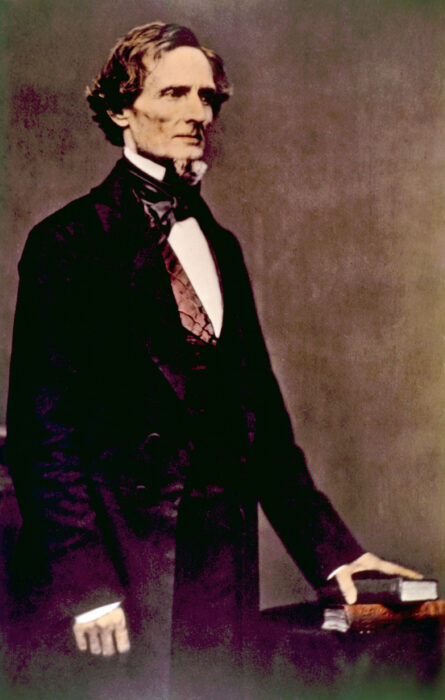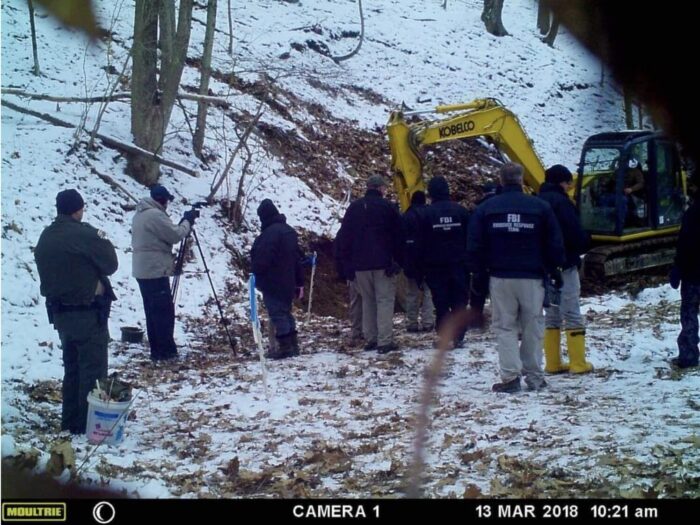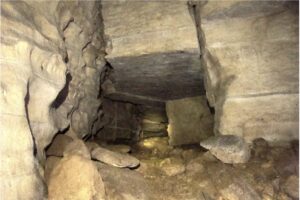In wartime, even losing soldiers and politicians always make a last-ditch effort to outsmart the enemy. In the 19th and 20th centuries, we see this when it comes to securing and hiding wealth. The American Civil War and Second World War abound in crazy tales of lost treasures. This week, we look at three famous fortunes that are still out there. Today, Lost Civil War Gold.
Nearly eight years ago, in March 2018, residents of Dent’s Run, Pennsylvania, woke up to metallic banging, loud voices, and jackhammers. A full-scale hillside excavation was underway. Men and women in FBI jackets were supervising. What were they looking for?
The dig caused a nationwide scandal, with local treasure hunters accusing the FBI of stealing and covering up one of the most important finds in American history: lost Civil War gold.
What was it? All armies need funds for their war effort. Apart from the gold in the Confederate states’ bank reserves, they also received donations from Confederate supporters. Women donated items like gold necklaces, rings, earrings, bracelets, brooches, and precious jewels. There was also a considerable amount of paper currency, as well as gold and silver coins. Today, that treasure is allegedly worth over $100 million.

Jefferson Davis, president of the Confederate States of America. Photo: Everett Collection/Shutterstock
An army fast approaching…
The story begins during the last days of the Civil War. The Confederate army was in desperate straits. After four bloody years of conflict and the deaths of 620,000 soldiers, the last Confederate stronghold — its capital, Richmond, Virginia — was about to fall to the Union army.
It was so bad that General Robert E. Lee told Jefferson Davis, the president of the Confederate States of America, that he and his cabinet needed to flee Richmond immediately. Wasting no time, Davis loaded two trains, one with his troops, family, top-secret documents, and cabinet members, and the other with the entire Confederate treasury. Confederate leaders then developed several plans to hide or relocate their wealth to prevent Union forces from seizing it.
Where did it go?
In the Georgia Historical Quarterly, dated September 1918, writer Otis Ashmore gives us an interesting detail. He says:
As late as 1881, so distinguished a man as General Joseph E. Johnston, in an interview in the Philadelphia Press, strongly intimated that much of this treasure had been misappropriated by the Confederate officials, and cast grave reflections upon the integrity of President Davis himself…
It is necessary to bear in mind that there were two separate and distinct funds which were brought away from Richmond under the same guard and on the same train. One was the public fund of the Confederate Government, and the other the private property of certain Virginia banks, whose officers decided to seek safety and protection for their funds under the same military escort provided for the Confederate funds…
President Davis hoped to meet with supporters in Florida but was captured by Union soldiers in Irwinville, Georgia, on May 10, 1865, supposedly wearing women’s clothes. They found no treasure on him except a “couple of bucks” in his pockets.
Some rumors suggest that before his capture, Davis sent the funds southward to establish a Confederate stronghold elsewhere. Richmond bank reserves were also deposited into a vault in Washington, Georgia. Treasury funds were then transported to Abbeville in South Carolina so that Davis could distribute them among the military.
Robbers in Georgia stole the Richmond bank reserves. Since it was too much to carry, they buried their booty in the mountains. Supposedly, Davis also gave $86,000 worth of treasure to two Navy men to escort to England. However, they stole it.
Historians believe that the treasury was simply divided up to pay Confederate Army wages, while Union troops appropriated some of it.
Is it in Lake Michigan?
In 1921, a Michigan banker named George Alexander Abbott was on his deathbed when he told his loved ones that he had stolen Confederate gold, which now lay at the bottom of Lake Michigan. According to this account, which had been handed down from generation to generation, a boxcar stuffed with Confederate treasure was pushed or accidentally fell off a boat in Lake Michigan one stormy evening.
Colonel Robert Horatio George Minty, the man in charge of the unit that arrested Davis, might have been responsible. Minty happened to be Abbott’s brother-in-law. According to documents, he was wrongfully court-martialed by the Union Army.
Disgraced, he then worked on the railroad. Two treasure hunters and divers, Frederick J. Monroe and Kevin Dykstra, believe that he may have used his knowledge of the railroad networks to smuggle the gold from Georgia, where it was purportedly buried, to Michigan, where he lived.
Furthermore, they believe his destination was Michigan’s Upper Peninsula. So, during a storm, the boxcar on the boat with the gold would have been pushed off — a regular practice for sailors transporting heavy boxcars, to avoid a capsize in rough seas.
Several years ago, during a dive in Lake Michigan, Monroe and Dykstra found a boxcar. Alas, it only contained coal, but they were optimistic that the gold remained somewhere on the lake bed. The popular History Channel TV show, The Curse of Civil War Gold, documented their quest. However, there has been no recent evidence.
The Feds
Fast forward to 2018. The FBI went to Dent’s Run, Pennsylvania, after one of its special agents, Jacob B. Archer, supposedly discovered a “cultural heritage site containing gold belonging to the United States Government,” according to an FBI report. Eyewitness accounts describe seeing several FBI agents, heavy excavation equipment, and armored cars.
One even reported seeing an armored car riding very low to the ground, as if weighed down by something heavy. The dig occurred at night.

Image taken of the FBI agents at the site. Photo: All That’s Interesting
Two treasure hunters, Dennis Parada and his son, have been working to get the FBI to release all the information on the site. They believe the organization cheated them out of a hefty finder’s fee, presumably claiming they discovered this Civil War-era gold. The FBI did admit that it was trying to find gold in that area.
According to a report on CBS, “Local lore says an 1863 shipment of Union gold disappeared on its way to the U.S. Mint in Philadelphia.” Although in this instance it was Union rather than Confederate gold, it suggests that there may be more than one potential cache of Civil War treasure to be found.






